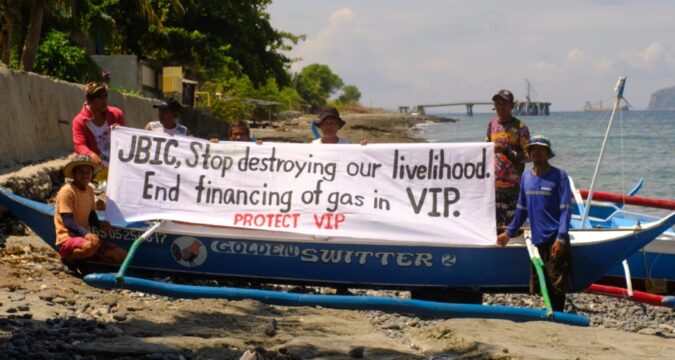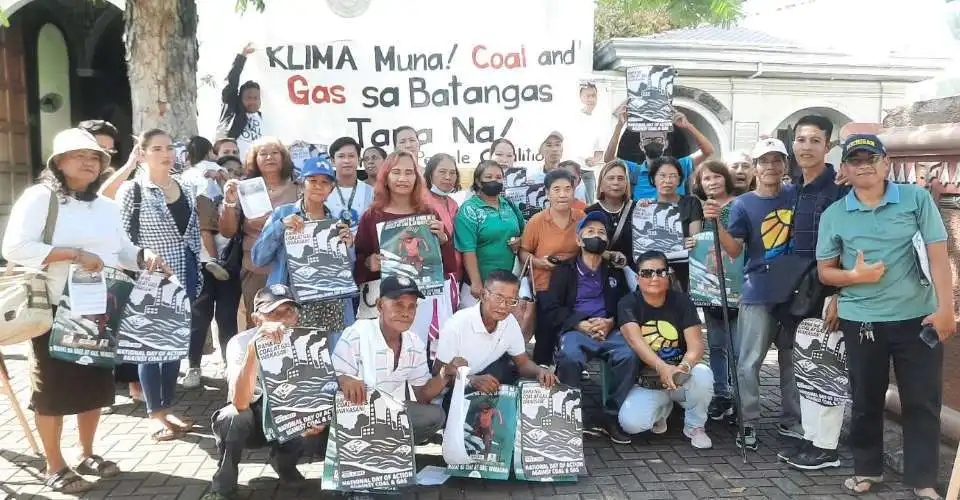
MANILA (UCAN): At sunrise along the coast of Batangas, the Philippines, fisherfolk haul in their nets—sparser than in years past. Beyond their boats, tankers and gas terminals line the horizon, posing a grave threat to one of the world’s most biodiverse marine corridors: the Verde Island Passage [VIP].
Stretching across five Philippine provinces—Batangas, Marinduque, Occidental Mindoro, Oriental Mindoro, and Romblon—the 1.4-million-hectare corridor teems with life.
Scientists estimate the passage harbours 60 per cent of the world’s known shore fish species and more than 300 coral reef species, earning it the title “the Amazon of the Oceans.”
Yet this global treasure is now at the centre of a conflict between fossil gas and LNG [liquid natural gas] interests and faith-based, community-led environmental activists.
Three corporate energy giants—San Miguel Corporation [SMC], Metro Pacific Investments, and Aboitiz Power—face accusations of advancing projects to exploit extensive gas and LNG reserves, particularly in Batangas, despite a national moratorium on new coal plants.
Yet this global treasure is now at the centre of a conflict between fossil gas and LNG [liquid natural gas] interests and faith-based, community-led environmental activists
Their construction of facilities, environmentalists say, has already wiped out coral reefs, seagrass beds, and mangroves that are spawning grounds for marine life.
Thermal pollution bleaches coral and disrupts the breeding and feeding patterns of some species, while chemical pollution contaminates the water and marine life, activists say.
LNG terminals and tanker traffic also generate intense underwater noise, disturbing whales and dolphins that depend on sound for navigation.

And while gas is often marketed as a “transition fuel”, it is mainly methane—a greenhouse gas 80 times more potent than carbon dioxide over a 20-year period, according to the United Nations Environment Programme.
As we celebrate the 500 years of Christianity in the Philippines. The Chaplaincy to Filipino Migrants organises an on-line talk every Tuesday at 9.00pm. You can join us at:
https://www.Facebook.com/CFM-Gifted-to-give-101039001847033
Methane leaks during LNG production and transport further heats the planet and accelerate coral bleaching in already stressed marine ecosystems, according to experts.
And while gas is often marketed as a ‘transition fuel’, it is mainly methane—a greenhouse gas 80 times more potent than carbon dioxide over a 20-year period, according to the United Nations Environment Programme
The 2023 oil spill from a San Miguel subsidiary’s tanker in Oriental Mindoro—causing an estimated US$735 million in damages—only deepened the economic and ecological crisis.
“Our faith compels us to defend creation, protect the poor, and pursue justice in line with the gospel mission,” said lead campaigner, Father Edwin Gariguez, environmental activist of the Apostolic Vicariate of Calapan.
Pope Francis’ 2015 encyclical, Laudato Si’, reminds the world “we are called to respond to the cry of the earth and the cry of the poor, especially as poverty is often associated with or partly caused by environmental destruction and fragile ecosystems.”
Father Gariguez’s work—supported by Caritas Philippines—has galvanised the community in united action against what they call “a new colonisation” by the oil and gas industry.
Against these odds, the Protect VIP Campaign began in 2020 and was formally launched in 2022 as a community action to save the environment and lives.
The coalition—made up of faith-based groups, academics, civil society organisations, young people, and coastal communities—represents hundreds of thousands of people, including 30 People’s Organisations and Civil Society Groups and their members.
Our faith compels us to defend creation, protect the poor, and pursue justice in line with the gospel mission
Father Edwin Gariguez
As part of the campaign, they engage local government units and oil and gas financiers in dialogue, advocate for policy reform, and participate in legal battles to protect their natural resources.
They also organise protests, run signature campaigns, hold prayer rallies, and continue to inform, educate, conduct social media campaigns, and issue pastoral statements.
Local communities, Father Gariguez explained, design, launch, and run their campaigns in their areas; the Church, through its social action programme led by Caritas Philippines, provides the space for discussion, supports action, and builds community leadership.
Protect VIP coordinates the whole campaign, represents communities in international finance and divestment campaigns, in legal cases, and media campaigns, the priest said.
Nearly two million people directly depend on the waters of the Verde Island Passage for food and livelihoods. Women play vital roles in nearshore fishing, fish processing, and trade, while men venture farther out to sea.
In 2023 alone, the region’s commercial fisheries generated “roughly US$135 million, and tourism continues to boost local incomes”, according to Gerry Arances, executive director of the Centre for Energy, Ecology and Development (CEED).
Nearly two million people directly depend on the waters of the Verde Island Passage for food and livelihoods. Women play vital roles in nearshore fishing, fish processing, and trade, while men venture farther out to sea
“The VIP’s biodiversity is our natural capital. To destroy it is to dismantle both ecology and economy,” she said.
“The ecological toll inevitably becomes a disaster for people. Small-scale fisherfolk, squeezed out of their traditional fishing grounds, face dwindling catches that threaten their primary source of food and income and are forced to venture into more dangerous seas,” Arances said.
Persistent advocacy has prompted several global banks to withdraw from Verde Island Passage-related fossil gas and LNG projects—victories organisers describe as some of the campaign’s “big wins” over the past five years.
Germany’s DWS Group divested from SMC in 2023, citing environmental and governance concerns. Austria’s Erste Bank and BNP Paribas followed suit. Even Japan’s state-owned JBIC was forced to review its compliance with environmental safeguards.
“The campaign has reframed the issue,” Arances said. “It’s not just about local pollution—it’s also very much about global finance enabling destruction in one of Earth’s richest marine ecosystems.”
Legal victories have also followed. The Philippine Court of Appeals recently ordered the Department of Environment and Natural Resources to investigate and regulate water quality in the passage, tightening controls on new sources of pollution under the National Clean Water Act.
However, challenges continue. A new national law that promotes gas development threatens to undo years of progress.
“We have no choice but to continue”, Father Gariguez says. “Defending the Verde Island Passage is defending life itself—our home, our people, our faith.”



